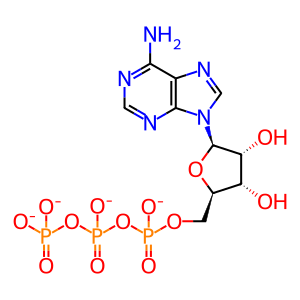Reaction: NFKBIA variant is not phosphorylated within IkBA:NF-kappaB
- in pathway: IkBA variant leads to EDA-ID
Several patients with ectodermal dysplasia with immunodeficiency (EDA-ID) were found to carry mutations in NFKBIA gene, which encodes inhibitor of NFkB alpha (IKBA, IkB alpha or NFKBIA) (Courtois G et al. 2003; MacDonald DR et al. 2007; Lopes-Granados E et al. 2008; Schimke LF et al. 2013; Ohnidi). All human NFKBIA mutations are heterozygous gain-of-function (GoF) mutations that augment NFkB inhibition, causing autosomal dominant disease (Courtois G et al. 2003; Schimke LF et al. 2013; Zhang Q et al. 2016). NFKBIA mutations are either substitutions (S32I or M37K) affecting the phosphorylation of residues Ser32 and Ser36 or nonsense mutations (W11TER or E14TER) (Courtois G et al. 2003; Lopes-Granados E et al. 2008; Schimke LF et al. 2013; Zhang Q et al. 2016). The nonsense mutations in NFKBIA gene causing premature termination codons at positions 9 (Q9TER), 11 (W11TER), or 14 (E14TER) lead to translation reinitiation at an in-frame M37 downstream of the nonsense mutations resulting in the N-terminally truncated variant (NFKBIA F2_M37del) that lacks the critical phosphorylation sites at Ser32 or Ser36 (Lopes-Granados E et al. 2008; Schimke LF et al. 2013; Ohnishi H et al. 2012).The NFKBIA (IkBa) protein variants are expressed but cannot undergo phosphorylation-driven degradation. Disregarding induction signals, they remain constitutively bound to NFkB dimer and freeze the pathway sequestering NFkB dimers in the cytoplasm (Courtois G et al. 2003; Lopes-Granados E et al. 2008; Schimke LF et al. 2013). This has been verified by overexpressing mutant NFKBIA proteins encoded by patient alleles and showing that they override the wild-type protein and block NFkB-induced gene expression (Courtois G et al., 2003). NFkB signaling can be variably impaired in patients with IKBA-deficiency ranging from severe dominant-negative effect of NFKBIA S32I variant comparing to NFKBIA W11TER which results in functional NFkB haploinsufficiency (Lopes-Granados E et al. 2008; McDonald DR et al, 2007).
Reaction - small molecule participants:
ATP [cytosol]
Reactome.org reaction link: R-HSA-5228811
======
Reaction input - small molecules:
ATP(4-)
Reaction output - small molecules:
Reactome.org link: R-HSA-5228811

